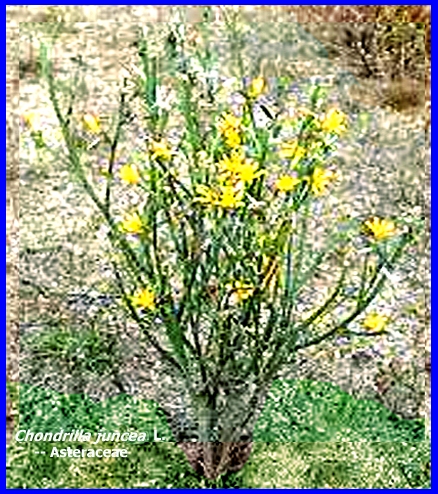FILE: <ch-96.htm> GENERAL INDEX [Navigate to MAIN MENU
]
|
RUSH SKELETON WEED Chondrilla juncea L. -- Asteraceae (Contacts) ----- CLICK on Photo to enlarge & search for Subject Matter with Ctrl/F. GO TO ALL: Bio-Control Cases
A strain of the
rust, Puccinia chondrillina Bubak & Sydow,
was introduced from southern Italy to Australia in 1971 and spread rapidly to
all infested areas. But this
particular strain of rust caused significant reductions in densities of Form
A in all areas. Other organisms
introduced, but having a lesser impact on skeletonweed, included a gall
midge, Cystophora schmidti Rubsaamen (Diptera:
Cecidomyiidae), a gall mite, Aceria
chondrillae Can. (Acari:
Eriophyidae), and a root moth, Bradyrrhoa
gilveolella Tr. (Lep.:
Phycitidae). There were indications
that Form B and C of the skeletonweed would continue to spread and eventually
fill the vacant niche left by Form A.
Another strain of the skeletonweed rust has been recently introduced
and it attacks only Form B. Other
organisms are through to be necessary to control Form C (Wells 1970, Wapshere
et al. 1974, Groves & Cullen 1977, Burdon et al. 1981, Cullen & Moore
1983). In summary, the
biological control of rush skeletonweed, Chondrilla
juncea L. in Australia was
the first project to involve the intentional international transfer of a
phytopathogen for the biological control of a plant, i.e., the rust fungus Puccinia chondrillina Bubak & Sydenham (Uredinales) between
Italy and Australia in 1971 for the successful biological control of a
noxious plant (Goeden & Andrés 1999).
This project also was one of the first to target a plant pest of
cropland (dryland wheat). It
established procedures for testing phytopathogens for host specificity under
quarantine conditions and involved the first intentional importation in 1971
of a phytophagous mite, Eriophyes
chondrillae for biological
control (Cullen 1974, 1978). REFERENCES: [Additional references may be found at: MELVYL
Library ] Burdon, J. J., R. H. Groves & J. M. Cullen. 1981.
The impact of biological control on the distribution and abundance of Chondrilla juncea in south-eastern Australia. J. Appl. Ecol. 18: 957-66. Cullen, J. M. 1974. Seasonal and regional variation in the
success of organisms imported to combat skeleton weed Chondrilla juncea
L. in Australia, p. 111-17. In: A. J. Wapshere (ed.), Proceedings of the III International
Symposium on Biological Control of Weeds, 1973, Montpellier, France. Cullen, J. M. 1978. Evaluating the success of the programme
for the biological control of Chondrilla
juncea in Australia, p.
233-39. In: T. E. Freeman
(ed.), Proceedings of the IV International Symposium on Biological Control of
Weeds, 1976, Gainesville, Florida. Cullen, J. M. & A. D. Moore.
1983. The influence of three
populations of Aceria chondrillae on three forms of Chondrilla juncea. J. Appl. Ecol.
20: 235-43. Goeden, R. D. & L. A. Andrés. 1999. Biological control
of weeds in terrestrial and aquatic environments. In: Bellows, T. S. & T. W. Fisher (eds.), Handbook of Biological Control: Principles and Applications. Academic Press, San Diego, New York. 1046 p. Groves, R. H. & J. M. Cullen. 1977. Chondrilla juncea: the
ecological control of a weed, p. 7-17.
In: Kithing & Jones (eds.), The Ecology of
Pests. CSIRO,
Australia. 253 p. Wapshere, A. J., S. Hasan, C. K. Wahba & L. Caresche. 1974.
The ecology of Chondrilla
juncea in the western
Mediterranean. J. Appl. Ecol.
11: 783-800. Wells, C. J. 1970. The ecology and control of skeleton weed (Chondrilla juncea) in Australia.
J. Aust. Inst. Agric. Sci.
37: 122-37. |
